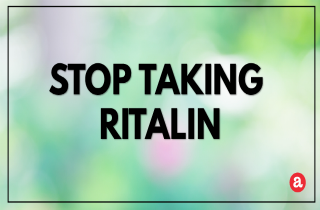READING SUMMARY: The best way to stop Ritalin is under medical supervision. Tapering guidelines can help ease withdrawal symptoms. Sometimes, a medical detox or a stay in rehab is necessary.
TABLE OF CONTENTS
- Can I Just Stop?
- Reasons to Quit
- What Happens When You Stop
- Withdrawal
- Abrupt Cessation
- The Safe Way to Stop
- Tapering
- What’s Next?
- When to Call a Professional
- Ask a Question
Can I Just Stop Taking Ritalin?
No, it’s not wise to just stop taking Ritalin.
The main ingredient in Ritalin’s FDA drug label is methylphenidate,a psychoactive drug that changes the way the brain functions. If you take Ritalin daily – for a period of a few weeks, or more – the methylphenidate causes physical dependence. If you try to just stop taking your Ritalin, it isn’t likely to be very successful and can cause serious adverse side effects. Instead, you should always consult with your prescribing doctor before you stop taking Ritalin.
Reasons To Quit
The psychostimulant methylphenidate is a Schedule II drug, which means that the U.S. Drug Enforcement Administration (DEA) see it as having a high potential for abuse. But this is not the only reason why you should stop using this medication. Here is a list of possible reasons that motivate people to quit.
1. Crashing.
Crashing is a sensation that usually appears after coming down off a stimulant drug such as Ritalin. The term crashing refers to the feeling of extreme depression and fatigue because the drug is no longer in the system. This extreme depression may cause suicidal thoughts and feelings.
2. Imbalance in brain chemistry.
Long term exposure to Ritalin can damage some brain receptors by flooding them with neurotransmitters. Overstimulation of neurotransmitter levels can reduce the brains natural ability to produce them. This might cause long term and sometimes permanent damage.
3. Emotional problems.
Since Ritalin targets brain chemistry, long term use may lead to anxiety, fearful behavior, paranoia and sometimes even depression. People who take large amounts of Ritalin for an extended time can end up struggling with mood disorders and other emotional issues.
4. Family and relationship problems.
The repeated use and abuse of this medication creates visible changes in your behavior and eventually your character. Becoming disturbed and defensive can directly impact relationships. It causes problems within your close circle. To an even larger degree, an addiction changes who you are. You may find that your previous friends no longer want to hang out with you or that your family avoids conflict.
5. Financial problems.
When purchased illegally, Ritalin is more expensive. When abusing this medication, you will constantly need money to buy your next dose. Plus, buying Ritalin without a medical prescription is considered illegal and financial issues can rapidly become a problem.
6. Hallucinations.
Some people who have used Ritalin for an extended period experience hallucinations and delusions. These effects diminish as soon as you stop taking the drug, but sometimes they can persist for months or years depending on how much and how long you took Ritalin.
7. Heart problems.
Any stimulant has the potential to permanently damage your heart if you take even a slightly higher dose than the one prescribed by your doctor. Some users who take large amounts of Ritalin may face heart failure and cardiac arrest.
8. Psychosis.
Psychosis is a common effect of long term Ritalin use because of the damage to some brain functions. Psychosis can be very dangerous if they are not taken care of as soon as they appear. The DEA warns that Ritalin produces many of the same effects as cocaine. Psychotic episodes and severe psychological addiction have all been associated with the abuse of this drug.
9. Psychological problems.
Besides psychosis, aggression can also appear as a result of long term Ritalin exposure. Those who use high levels of Ritalin are involved in domestic violence and assault cases.
10. Tolerance.
Tolerance and physical dependence always go hand in hand. Needing more Ritalin for initial therapeutic effect may require a taper or a period of abstinence before beginning dosing again.
What Happens When You Stop?
Ritalin stay in your system for a few days. So, both the immediate or controlled release versions of Ritalin usually clear your system within 72 hours. However, it takes time for your body to catch up. Once Ritalin is no longer in the brain, you begin to experience withdrawal symptoms. Why?
The body adapts and becomes used to methylphenidate over time. It has to in order to function. In fact, your brain starts to compensate for the presence of methylphenidate (which is a stimulant) by “slowing down” some processes. So when you stop taking Ritalin, you need time to adjust to living without it. This period of adjustment is called “withdrawal”.
Once you go through Ritalin withdrawal, you will start feeling normal again. Unfortunately, that period of adjustment usually includes uncomfortable side effects. In fact, Ritalin withdrawal can affect your cardiovascular system, mood, and energy levels.
Withdrawal
Since Ritalin is normally prescribed throughout the day, it may only take a few weeks to develop a physical dependence. Stopping methylphenidate can cause a number of severe withdrawal effects. If you’ve taken Ritalin long-term, withdrawal effects may be even worse. The common withdrawal symptoms that occur when you stop taking your medication can include:
- Cravings
- Fatigue
- Insomnia
- Intense hunger
- Irritability
- Moderate depression
- Nausea
More severe symptoms of Ritalin withdrawal include:
- Changes in heart rhythm
- Severe depression
- Slowed motor functions
NOTE: Always seek medical supervision when you’re ready to quit Ritalin. Suicidal thoughts due to chemical deficits can be treated with antidepressants.
Quitting Abruptly
Ritalin is easier to quit if you don’t stop taking it suddenly. Quitting suddenly increases the chance of nasty withdrawal symptoms, which can drive you to return to taking the drug. The best way to quit Ritalin is to gradually reduce your dose rather than stop all at once.
Stopping Ritalin cold turkey isn’t the best option for most people. But if you cannot slowly reduce your dose of methylphenidate due to addiction issues, or if you have medical problems with make it necessary to stop taking Ritalin right away, it can be done. If you decide to quit Ritalin cold turkey, you should consult a doctor on what to expect and how to do so safely. You might also want to speak to a therapist or counselor specializing in drug addiction, if you struggle with strong cravings and compulsions to take Ritalin.
The Safest Way To Stop
According to this 2010 article published in the Journal of Psychosocial and Mental Health Nurse Services, it is generally agreed that tapering stimulant medications, rather than abruptly stopping them, can avoid or minimize the potential adverse discontinuation effects associated with most psychotropic drugs.
So, the best way to stop taking Ritalin is to gradually reduce your daily dose over the course of several weeks. This is called “tapering”. However, you may need to be gradually tapered off the stimulant with close psychological support. This is because you may experience extreme fatigue, depression, or even suicidal thinking.
Tapering Guidelines
Tapering is a practice which involves a slow reduction in the amount of Ritalin over a scheduled period of time. This reduction lasts until the user completely stops taking the drug. Most taper schedule are customized for individuals, depending on the severity of drug dependence and the person’s overall health condition. This means that a certain protocol might prove successful for one, but may not work for someone else.
The individual response to dose reduction will determine the course of the schedule. For some people, even the slowest of tapering can still result in the onset of withdrawal symptoms. We recommend that you seek professional help whenever you decide that you want to quit Ritalin.
Your doctor can develop a dosing schedule for you to use, if you believe you’ll be able to stick to it. Following a doctor’s directions is the safest way to quit taking Ritalin. Though the side effects may be difficult to deal with, they’re unlikely to be dangerous. If you have any concerns about withdrawal effects or the safety of quitting Ritalin, consult a doctor.
What’s Next?
Giving up a psychoactive drug is never easy. The least we can say is that it’s a challenging experience. Once you know and decide you want to get help there are several options available. While some people try stop using Ritalin on their own, the reality is that most fail to do so without treatment and long term support.
So, when can you benefit from professional help? You may need the expert help from substance use professionals if you experience any of the following:
- You’ve tried to quit on your own but cannot stay quit.
- You think about Ritalin obsessively.
- You get high from Ritalin.
- You cannot imagine life without Ritalin.
you can always use this physician’s online questionnaire from NIDA to self-assess a possible problem. Or, you can visit your family doctor or even call our hotline number listed on the page. If substance use disorder is present, there are two main types of treatment to choose from: inpatient or outpatient treatment. Find out which type of treatment is right for you and get enrolled. Remember to include your friends and family for additional support. Recovery from Ritalin addiction takes courage and hard work, but once you are ready and willing you’ll see that a sober life is the best gift you will ever give yourself.
For help finding a treatment center you can use SAMHSA’s Behavioral Health Treatment Services Locator. It is a confidential and anonymous source of information for people seeking treatment facilities in the United States
When to Call a Professional
Always call a medical physician when you want to quit Ritalin. Why? Because your doctor is the one who prescribed your Rx and is in charge of administering the dosages, s/he knows the best way to help you. Together, you and your doctor should discuss a tapering plan.
Q: Why consult your doctor and not take the situation in your own hands?
A: First of all, your doctor knows your medical history best. S/He will be able to assist you in making a schedule to gradually lower your dosage and if needed prescribe you lower dose medications. Second, your doctor will support you in sticking to your program by prescribing you lower doses every time you need to step down. Third, a doctor can refer you to additional services, when needed.
Questions?
Still have questions about Ritalin? Please leave us your questions about Ritalin in the comments section below. We welcome all legitimate queries about methylphenidate and its use. In fact, we try try our best to respond to your questions with a personal and prompt reply. So, reach out!
Help is one click away.










Related Posts